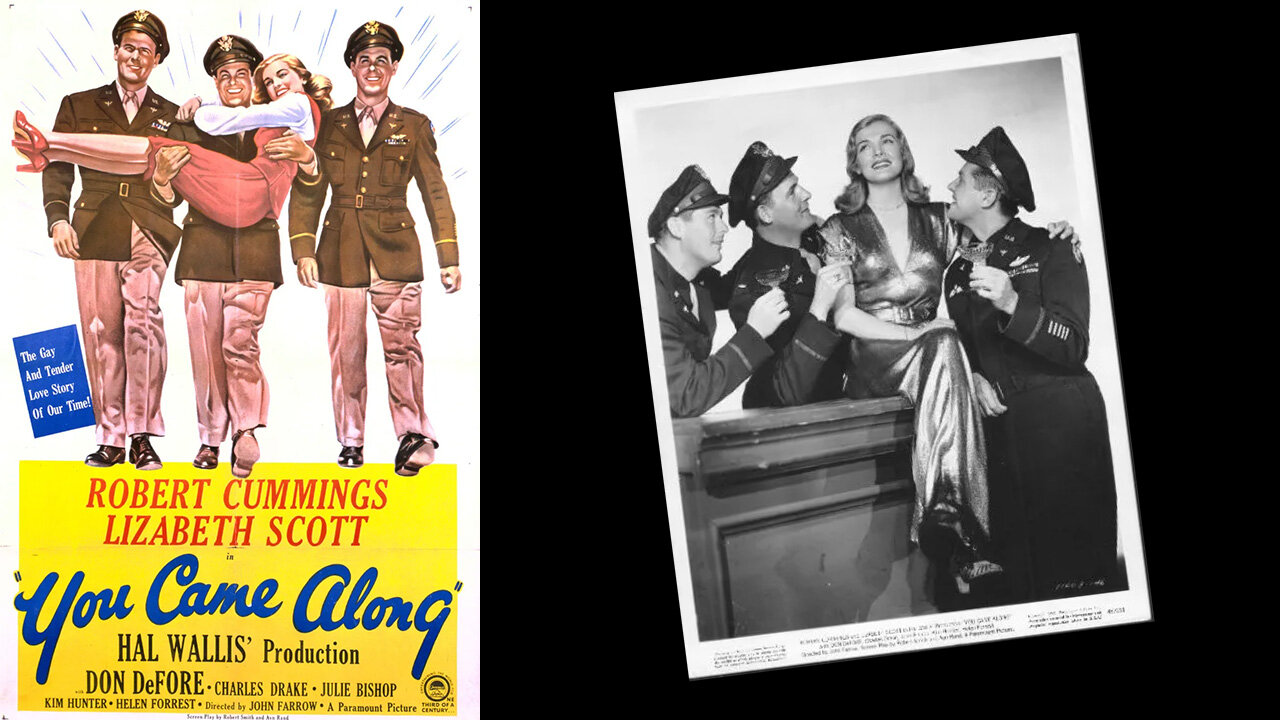Premium Only Content

'You Came Along' (1945) Screenplay by Ayn Rand
'You Came Along' is a wartime romantic drama directed by John Farrow, based on a story by Robert Smith and produced by Hal Wallis. Notably, the screenplay was written by Ayn Rand, who at the time was balancing her screenwriting career in Hollywood with her emerging literary and philosophical ambitions. While Rand would later distance herself from this film, 'You Came Along' is an intriguing artifact: it reveals the tensions between her personal philosophy and the demands of mid-1940s Hollywood sentimentalism. The film also illustrates how Rand, even under constraint, attempted to infuse her scripts with subtle thematic markers of integrity, self-control, and emotional restraint.
Plot Overview: The story follows Ivy "Hotcha" Hotchkiss (played by Lizabeth Scott), a U.S. Treasury Department publicist assigned to accompany three decorated Air Force officers—Bob, Shark, and "Handsome" Donnie—on a bond-selling tour across America. Unknown to Ivy, Donnie (played by Robert Cummings) is terminally ill. As they travel, Ivy and Donnie fall in love, but his condition casts a shadow over their romance.
The film balances light-hearted camaraderie with a developing emotional gravity. While it starts as a road movie filled with banter and patriotic optimism, it slowly morphs into a tragic romance centered on mortality, dignity, and the refusal to indulge in self-pity.
Rand's Thematic Presence: Though 'You Came Along' was a studio project and not Rand’s original idea, certain thematic undercurrents unmistakably reflect her sensibility. Donnie’s choice to hide his illness and face death with stoic silence aligns with Rand’s ideal of heroic self-control. He refuses to allow sentimentality or weakness to define him, insisting instead on living with dignity and maintaining his own standards.
Moreover, Rand’s influence is apparent in the moral contrast between characters. Donnie is principled and emotionally reserved, while the surrounding world encourages emotional indulgence. His unwillingness to tell Ivy about his condition is not only a romantic trope—it is a philosophical act of self-containment. In this, Rand seems to nod toward her concept of the rational egoist, someone who lives by inner convictions rather than external validation.
However, the script also reveals tensions between Rand’s philosophical instincts and the emotional expectations of the genre. Ivy, as the love interest, is depicted as emotionally open and desirous of intimacy—traits Rand usually reserved for female characters only when they were paired with men of exceptional vision or moral clarity. Here, Ivy’s warmth and persistence help Donnie open up emotionally, which might be read as a softening of Rand’s usually rigid gender and emotional dynamics. Alternatively, it may reflect the constraints placed upon her by studio executives aiming to reach a wide wartime audience hungry for comfort and romance.
Style and Tone: The film's tone is a delicate blend of comedy, drama, and wartime earnestness. Rand’s script (co-written with Richard Brooks, though Rand received primary credit) is sharp in its early scenes, capturing the light-hearted rapport among the three airmen with wit and economy. The dialogue sparkles in moments, particularly in the dry, guarded humor of Donnie’s lines—a reflection of Rand’s ability to shape intelligent, emotionally restrained characters.
As the film progresses into more serious territory, the script modulates carefully, avoiding melodrama in favor of quiet pathos. One of the most compelling elements is how Rand avoids overt sentimentality, particularly in Donnie’s final decisions. Even at the height of emotional intensity, characters act with a sense of control and dignity, a hallmark of Rand’s writing.
Performance and Direction: Lizabeth Scott, in one of her first major roles, plays Ivy with an ideal balance of softness and resolve. Her voice—famously husky and cool—contributes to the film’s tonal ambiguity, creating a character who is not merely a foil to Donnie but a grounding presence. Robert Cummings, known more for comedy than drama, surprises in his portrayal of Donnie: calm, resigned, and charismatic. His performance resonates particularly in moments of silence, where Rand’s writing allows space for reflection rather than over-explanation.
Director John Farrow manages to give the film visual rhythm without drawing too much attention to the camera. This restraint suits Rand’s script, which emphasizes character over spectacle. The film’s patriotic setting—wartime America—is presented without propaganda excess. Instead, the war becomes a quiet backdrop, reinforcing themes of duty, sacrifice, and the preciousness of time.
Historical and Philosophical Context: Ayn Rand wrote 'You Came Along' while 'The Fountainhead' was in galley proof and shortly before it would be published. The contrast between that novel’s grand, ideological declarations and the subtle emotional shading of this screenplay is stark. In many ways, 'You Came Along' is the most un-Randian of her surviving scripts—tender, humanist, and even tragic. It lacks the triumphalism and philosophical absolutism that define her mature work.
Yet Rand's hand is unmistakable in its moral center. Donnie dies on his own terms, having loved deeply but without abandoning his inner discipline. This ideal of spiritual independence—living according to one’s values, even in the face of death—is a core Randian motif, albeit presented here in a less overt, more humane package.
Rand’s Later View: In later years, Ayn Rand disowned most of her screenwriting work, including 'You Came Along', likely because it was a compromise: a studio assignment, not a work of her own philosophical design. She may also have resented the emotionality of the story, especially as it contradicts her later insistence on heroic strength over romantic suffering.
Yet viewers today may find something refreshing in this divergence. It shows Rand not as an ideologue, but as a working screenwriter with a capacity for nuance, empathy, and understated emotional truth.
Conclusion: 'You Came Along' (1945) is a surprising and poignant entry in Ayn Rand’s body of work. Though she did not originate the story and later dismissed it, her screenplay elevates the film with clear, structured dialogue and an emphasis on moral dignity. While the film conforms to the demands of wartime romance, it bears the subtle imprint of Rand’s emerging philosophy—particularly in its portrayal of self-contained heroism, emotional restraint, and the dignity of facing death on one’s own terms.
As a film, it is modest but moving. As a Randian artifact, it is quietly revealing. It reminds us that even the most doctrinaire thinkers are capable of producing humane and emotionally resonant work when circumstances demand it.
-
 36:28
36:28
TruthStream with Joe and Scott
1 day agoMark Attwood joins TruthStream in Ireland!
7.97K30 -
 2:13:30
2:13:30
Side Scrollers Podcast
1 day agoUK Introduces MANDATORY Digital ID + Dallas ICE Shooting BLAMED on Gaming + More | Side Scrollers
193K56 -
 LIVE
LIVE
Lofi Girl
2 years agoSynthwave Radio 🌌 - beats to chill/game to
147 watching -
 2:26:44
2:26:44
Tundra Tactical
7 hours ago $15.23 earned🎉 Pro-2A Party LIVE! | Zeke Stout Joins The Show With Tacoma Tactical
20K1 -
 2:36:47
2:36:47
BlackDiamondGunsandGear
9 hours agoAFTER HOURS ARMORY / The LEFT are Recruiting / Join the Leftist Gun Club?
10.3K8 -
 16:07
16:07
Ken LaCorte: Elephants in Rooms
13 hours ago $3.50 earnedWhy firefighting got political
17.7K4 -
 8:31
8:31
Rethinking the Dollar
18 hours agoBitcoin Secrets Nobody Talks About!
11.1K5 -
 2:36:47
2:36:47
DLDAfterDark
8 hours ago $4.01 earnedIs The Left Recruiting To KILL Conservatives? Hey Fascist, CATCH!
12.4K1 -
 22:53
22:53
Jasmin Laine
1 day agoParliament ERUPTS After "WORST Decision EVER!"—Carney Left SPEECHLESS by SHOCKING Report
37.9K83 -
 11:50
11:50
Mrgunsngear
1 day ago $11.44 earnedSteiner MPS Enclosed Red Dot: Better Than The ACRO P2? 🔴
40.4K18